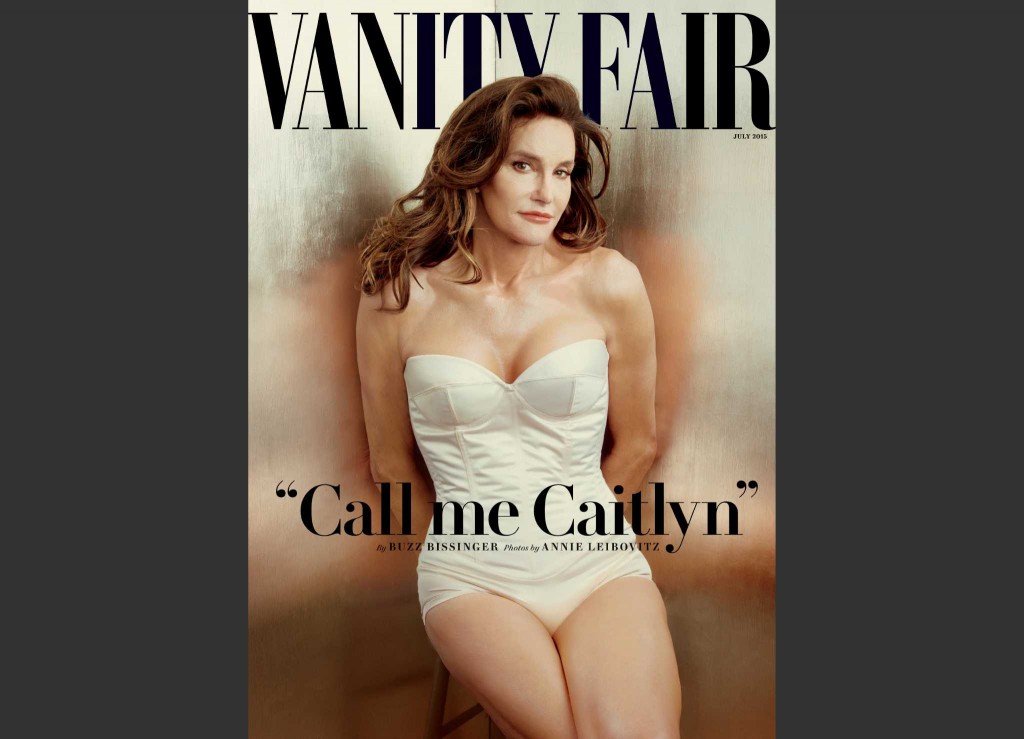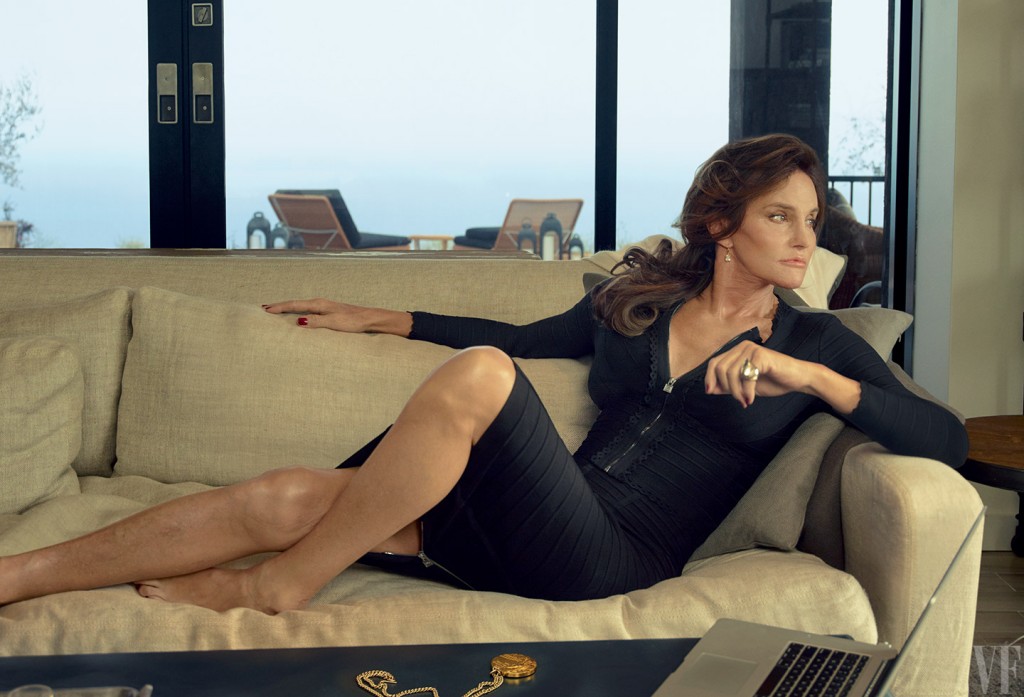
In April 2015, Olympic athlete and reality television star Bruce Jenner sat down with ABC’s Diane Sawyer to reveal his gender identity. Born male, Bruce declared that he always felt female and was going through the process of becoming a woman. In June, an image of Jenner dressed in a cream-colored bustier was the cover of Vanity Fair magazine, captioned by the pronouncement, “Call me Caitlyn.”
Those of us born in the last forty years have had little choice but to be affected by waves of cultural change. Every generation has this, of course, but generations who have been branded like cattle with the letters “x” and “y” have been placed in the unique position of both benefiting from the feminist and queer activism of those who came before us while also participating in a massive technological, Internet-based, and over-exposed celebrity culture which saturates our socialization. For feminist pop culture scholars like myself this is thrilling, especially considering the impact pop culture can have on society.
My generation was pushed into the “We are the World” phenomenon, the 1985 song whose proceeds benefited USA for Africa. We saw Magic Johnson announce his HIV status, forever cementing a childhood hero’s vulnerability and shattering ideas about ‘who gets AIDS.’ We were young and impressionable when Madonna came on the scene, her music and images pushing against gender roles.
In the decades that followed, we have witnessed our country’s shift in gay and lesbian rights, through comediennes like Ellen DeGeneres, pop stars and actors such as Lance Bass and Neil Patrick Harris as well as countless others who came out and then continued to have thriving careers.
My generation has watched as pop culture shined a light on issues such as violence against women, in part, because of the work of people like musician Tori Amos who co-founded RAINN, Angelina Jolie’s status as a U.N. goodwill ambassador and even men like WWE legend Mick Foley who regularly raise hundreds of thousands of dollars to support the work of RAINN and volunteer for the hotline.
Yet, these examples are of people acting intentionally and using their time and talent to better the world. Which is why it is surprising that a reality show, whose premise is to follow a wealthy family’s quest for stardom, is becoming part of social change.
Like most people, I know that beings called Kardashians and Jenners exist. The reality television show Keeping Up with the Kardashian’s has run regularly since 2008, featuring the blended family of Kris Kardashian and Bruce Jenner. The family’s popularity has had huge monetary gains and spurred a list of products too long to mention (here is a link to most of them), while simultaneously being critiqued for the “reality” created by the show’s producers.
It is because of the widespread impact of the show that leads me to think that the transition of Bruce Jenner to Caitlyn Jenner may be one of the single most important moments in pop culture for multiple generations. Whether we think of Caitlyn as an Olympic athlete, father or reality TV star, her transition from man to woman in such a public and well-orchestrated way is inescapable. Very few Americans can now say they do not know of someone who is transgender.
Caitlyn’s public revelation will undoubtedly help people who are struggling with transgender issues, being able to see ourselves and identify with another person is part of social development. It will also feed the masses of skeptical or cynical people who reject the power of celebrity. This is the beauty and brutality of popular culture.
Incredibly, watching the way Jenner has chronicled her life-long struggle with gender has placed terms like “gender identity” and “sex vs. gender” into media culture. The social construction of gender is becoming part of a national conversation, and gender studies scholarship is leaping into daily coverage of Jenner’s transition. Terms like ‘intersectionality’ are entering discussions about age (Jenner is 65), social class (she can afford the best surgical procedures) and privilege (unlimited resources aid her ability to transition and pass as a woman). Currently, gender studies is a focus of national media, something that was evident in the Keeping Up with the Kardashian’s special, “About Bruce” when Kim bluntly asked her step-father, “So if you’re a ‘woman’ and you used to have sex with my mom, does that mean you’re a lesbian?” In that moment, queer theory entered the Kardashian household. Millions of people were challenged to think about the spectrum of sexuality. Now, frank conversations about gender roles are popping up at dinner tables and coffee shops around the country.
Of course, Jenner’s experience does not speak for all transgender people. (How could it?)
As coverage of the Vanity Fair cover unfolded, comments about Caitlyn’s appearance were abundant. Being able to “pass” as male/female allows a certain amount of privilege for transgender people, their image conforms to set gender norms. There is comfort in men and women resembling our socially constructed ideas of male/female. Additionally, transitioning the way Caitlyn did was costly, the multiple surgeries and cosmetic procedures are not available for all. Further, as Jon Stewart noted, the media’s appetite for breaking down women’s looks is insatiable, as they did when the Vanity Fair image was released.

For transgender people there is already a high level of scrutiny about their bodies and, for transgender women, her cultural capital is based on her beauty. Jenner is lucky, she met these social expectations, CNN even declared her to be “stunning.” Passing is not as easy for many transgender people. There are limited resources for most to have a perfect coming out.
Regardless, the spotlight Caitlyn has elected to shine on herself is going to change lives. Gender, in all its inceptions, needs to be a part of the national conversation and Caitlyn Jenner is doing just that. I can’t wait to see what happens next.
________________
 Adrienne Trier-Bieniek PhD is a gender and pop culture sociologist. She is the author of Sing Us a Song, Piano Woman: Female Fans and the Music of Tori Amos (Scarecrow Press, 2013) and co-editor of Gender and Pop Culture: A Text-Reader (Sense, 2014). Her writing has appeared in various academic journals as well as xoJane, The Mary Sue, Gender & Society Blog, Feministing, and Girl w/Pen, and she runs the Facebook page Pop Culture Feminism. Adrienne Trier-Bieniek is a professor of sociology at Valencia College in Orlando, Florida.
Adrienne Trier-Bieniek PhD is a gender and pop culture sociologist. She is the author of Sing Us a Song, Piano Woman: Female Fans and the Music of Tori Amos (Scarecrow Press, 2013) and co-editor of Gender and Pop Culture: A Text-Reader (Sense, 2014). Her writing has appeared in various academic journals as well as xoJane, The Mary Sue, Gender & Society Blog, Feministing, and Girl w/Pen, and she runs the Facebook page Pop Culture Feminism. Adrienne Trier-Bieniek is a professor of sociology at Valencia College in Orlando, Florida.
